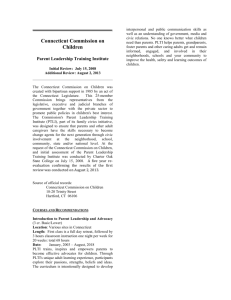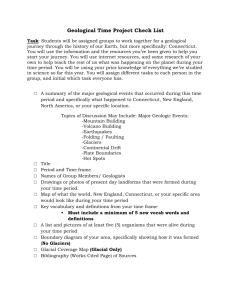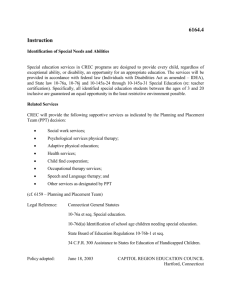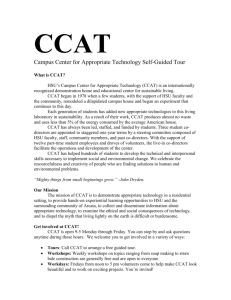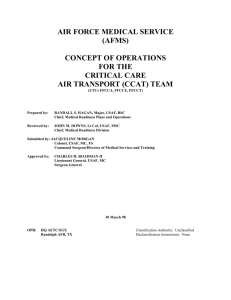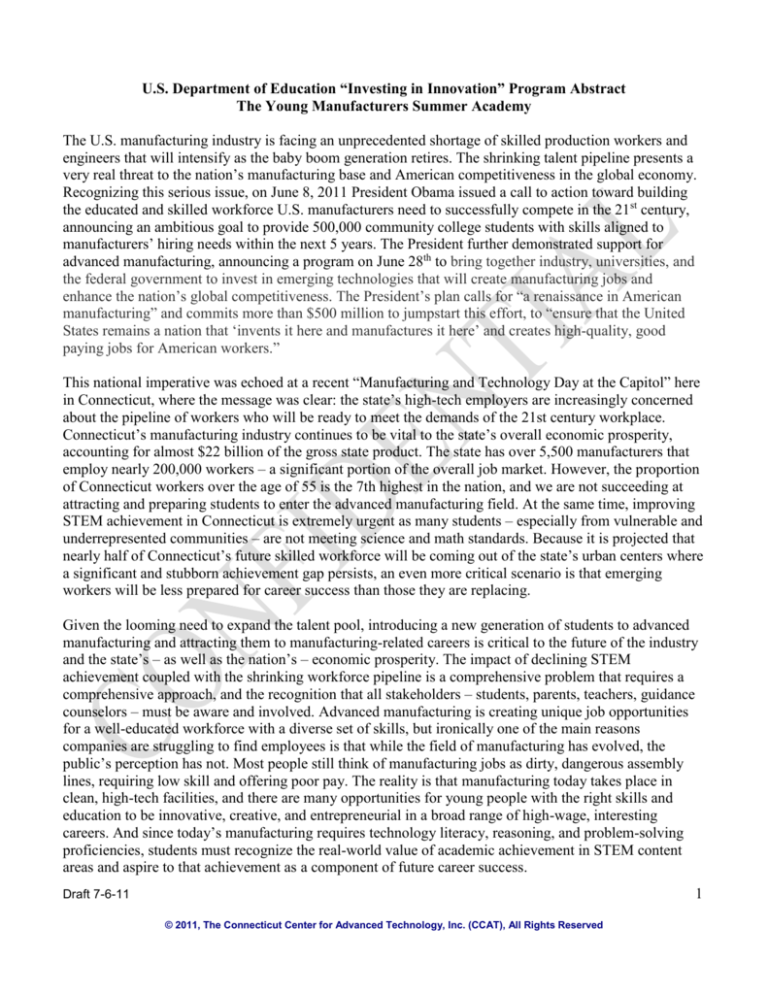
U.S. Department of Education “Investing in Innovation” Program Abstract
The Young Manufacturers Summer Academy
The U.S. manufacturing industry is facing an unprecedented shortage of skilled production workers and
engineers that will intensify as the baby boom generation retires. The shrinking talent pipeline presents a
very real threat to the nation’s manufacturing base and American competitiveness in the global economy.
Recognizing this serious issue, on June 8, 2011 President Obama issued a call to action toward building
the educated and skilled workforce U.S. manufacturers need to successfully compete in the 21st century,
announcing an ambitious goal to provide 500,000 community college students with skills aligned to
manufacturers’ hiring needs within the next 5 years. The President further demonstrated support for
advanced manufacturing, announcing a program on June 28th to bring together industry, universities, and
the federal government to invest in emerging technologies that will create manufacturing jobs and
enhance the nation’s global competitiveness. The President’s plan calls for “a renaissance in American
manufacturing” and commits more than $500 million to jumpstart this effort, to “ensure that the United
States remains a nation that ‘invents it here and manufactures it here’ and creates high-quality, good
paying jobs for American workers.”
This national imperative was echoed at a recent “Manufacturing and Technology Day at the Capitol” here
in Connecticut, where the message was clear: the state’s high-tech employers are increasingly concerned
about the pipeline of workers who will be ready to meet the demands of the 21st century workplace.
Connecticut’s manufacturing industry continues to be vital to the state’s overall economic prosperity,
accounting for almost $22 billion of the gross state product. The state has over 5,500 manufacturers that
employ nearly 200,000 workers – a significant portion of the overall job market. However, the proportion
of Connecticut workers over the age of 55 is the 7th highest in the nation, and we are not succeeding at
attracting and preparing students to enter the advanced manufacturing field. At the same time, improving
STEM achievement in Connecticut is extremely urgent as many students – especially from vulnerable and
underrepresented communities – are not meeting science and math standards. Because it is projected that
nearly half of Connecticut’s future skilled workforce will be coming out of the state’s urban centers where
a significant and stubborn achievement gap persists, an even more critical scenario is that emerging
workers will be less prepared for career success than those they are replacing.
Given the looming need to expand the talent pool, introducing a new generation of students to advanced
manufacturing and attracting them to manufacturing-related careers is critical to the future of the industry
and the state’s – as well as the nation’s – economic prosperity. The impact of declining STEM
achievement coupled with the shrinking workforce pipeline is a comprehensive problem that requires a
comprehensive approach, and the recognition that all stakeholders – students, parents, teachers, guidance
counselors – must be aware and involved. Advanced manufacturing is creating unique job opportunities
for a well-educated workforce with a diverse set of skills, but ironically one of the main reasons
companies are struggling to find employees is that while the field of manufacturing has evolved, the
public’s perception has not. Most people still think of manufacturing jobs as dirty, dangerous assembly
lines, requiring low skill and offering poor pay. The reality is that manufacturing today takes place in
clean, high-tech facilities, and there are many opportunities for young people with the right skills and
education to be innovative, creative, and entrepreneurial in a broad range of high-wage, interesting
careers. And since today’s manufacturing requires technology literacy, reasoning, and problem-solving
proficiencies, students must recognize the real-world value of academic achievement in STEM content
areas and aspire to that achievement as a component of future career success.
1
Draft 7-6-11
© 2011, The Connecticut Center for Advanced Technology, Inc. (CCAT), All Rights Reserved
To address this challenge, the Connecticut Center for Advanced Technology, Inc. (CCAT) has partnered
with the state’s Technical High School System and the Community College System’s College of
Technology/NSF Regional Center for Next Generation Manufacturing to offer a unique experiential
summer program: the Young Manufacturers Summer Academy (YMSA). Now in its third year, this
two-week pilot program gives middle school students the opportunity to gain actual machine shop floor
experience, attend workshops using high-tech tools and computer simulations, take field trips to local
companies, and learn more about the variety of educational pathways that support careers in
manufacturing: technical high school, OJT, certificate programs, community college, or 4-year
colleges/universities. YMSA students also develop workforce readiness “soft skills,” writing résumés,
receiving coaching in effective communication and collaboration, and participating in a mock career fair
capstone event attended by parents and families. The program is particularly focused on recruiting
participants from traditionally under-represented cohorts: minorities, girls, and at-risk youth. Over the past
two summers, the Academy has introduced more than 150 girls and boys to future careers in
manufacturing. Since the program began, enrollment in Manufacturing Technologies at the three technical
high school YMSA program sites has increased by an average of 20%.
With funding from a U.S. Department of Education’s “Investing in Innovation” (i3) Development Grant,
CCAT proposes to expand the YMSA pilot program as a full statewide initiative, in partnership with the
Connecticut Technical High School System as the grant LEA and the Connecticut Community College
System College of Technology (COT). The expanded YMSA will include programming for grade 6-8
students at 14 technical high schools and add academies for grade 9-11 students at 5 community colleges.
The expanded i3 YMSA program will provide over 600 students each summer from cities and towns
across Connecticut with project-based activities introducing all facets of the manufacturing industry,
recognizing that growing the talent pipeline means developing the technicians, machinists, programmers,
engineers, and quality control workforce that the manufacturing industry requires. Through its hands-on
and authentic curriculum, YMSA will also reinforce in-school STEM learning and develop an
appreciation for achievement in science, technology, engineering, and mathematics.
For years, national career-focused clubs and out-of-school-time (OST) programs such as DECA (an
organization for high school and college students interested in careers in marketing, management and
entrepreneurship), Junior Achievement, and the FFA (Future Farmers of America) have offered countless
young people a chance to explore careers through real world experiences. Informal education settings
such as these are an invitation to “use a different lens,” providing students with a learning environment
grounded in the kind of hands-on, problem-based activities and interaction that develop the critical
thinking, teamwork, and leadership skills needed for career and life success. However, among the myriad
of available experiences, there have been no activities solely devoted to involving young people in the
world of manufacturing. The i3 YMSA program will provide a scalable model for broad-based
implementation, with support from the Society of Manufacturing Engineers (SME) and The
Manufacturing Institute. CCAT is leading state efforts for deployment of the Washington, D.C.-based
Manufacturing Institute’s “Dream It. Do It,” initiative, a national program focused on increasing the
number of students choosing to pursue educational and career pathways in manufacturing and the number
of prepared applicants for manufacturing jobs through the attainment of the National Association of
Manufacturers-endorsed skills credentials. CCAT will have the opportunity to leverage the assets of the
“Dream It. Do It.” and Skills Certification System network and its industry partners, along with SME and
its Education Foundation, to inform and expand YMSA on a national level.
2
Draft 7-6-11
© 2011, The Connecticut Center for Advanced Technology, Inc. (CCAT), All Rights Reserved
YMSA’s approach for attracting youth – especially underrepresented urban populations – to
manufacturing careers has been carefully considered, taking into account a clearly articulated set of
objectives. These include:
an increased awareness of today’s high-tech manufacturing environments;
a realization of the broad range of manufacturing-related jobs required to support the current
and future industry, and associated salary levels;
a greater understanding of and appreciation for the STEM learning and technical skills needed
for success in the 21st century manufacturing workplace;
the importance of being able to work as a problem-solving group and to be able to measure the
effectiveness of that group in a dynamic environment; and
the different options available in educational pathways, training, and certification that lead to
rewarding careers in manufacturing.
Both process and product evaluation are embedded in the program. Students will complete pre and post
surveys assessing their knowledge of and perceptions about the manufacturing industry and
manufacturing-related careers. Content knowledge, including math and science skills, will be assessed
through evaluation of the program capstone project and on-going journaling activities. Through a
proposed partnership with the Connecticut State Department of Education, student participants will also
be tracked on a number of data points – high school and course selection, internship and job shadowing
participation, and achievement in science and math – to determine program success.
The i3 YMSA program will create a true “2 + 2 +2” model. Middle school programs will introduce
students to training and credentialing opportunities available through the state’s technical high school
system. Academies held on community college campuses for older students will focus on educational
pathways for certifications, 2-year, and/or 4-year degrees, with particular emphasis on articulation
agreements in place between the state’s community colleges and engineering degree-conferring proposed
grant partners such as the University of Connecticut, Central Connecticut State University, and the
University of Hartford. In addition to family involvement in the program capstone activities, information
sessions will be held by Community College System staff for high school students and their parents/
guardians to provide assistance in the application and financial aid process. School year activities will
include several Saturday “events” for Academy student alumni to provide program continuity, including
field trips to community college and university partner campuses. Professional development workshops
will be held throughout the year for teachers and guidance counselors to promote a clear understanding of
today’s high-tech, advanced manufacturing and its contribution to innovation, productivity, economic
growth, and high quality careers, and to provide them with the tools needed to increase student
participation and achievement in STEM.
Lastly, the role of the manufacturing industry and state agencies in support of YMSA will be critical to
the success of the program. CCAT will work directly with the Connecticut Business and Industry
Association (CBIA) and the State Department of Labor to engage manufacturers and manufacturingrelated organizations such as the Aerospace Component Manufacturers, New Haven Manufacturing
Association and the Small Manufacturers Association, to provide field trips, mentors, student internships,
and speakers to further engage and inspire YMSA participants. These critical partnerships will also offer
additional experiences for student and teachers to gain exposure to manufacturing career opportunities
throughout the school year and post-program.
3
Draft 7-6-11
© 2011, The Connecticut Center for Advanced Technology, Inc. (CCAT), All Rights Reserved


